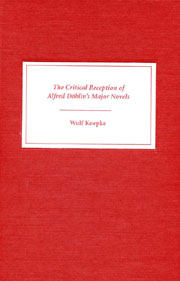Book contents
- Frontmatter
- Contents
- Preface
- Major Novels by Alfred Döblin
- Introduction
- Part One Contemporary Reviews
- Part Two Döblin Scholarship
- 3 Döblin Scholarship: The First Approaches
- 4 Die drei Sprünge des Wang-lun
- 5 Wadzeks Kampf mit der Dampfturbine
- 6 Wallenstein
- 7 Berge Meere und Giganten
- 8 Manas
- 9 Berlin Alexanderplatz
- 10 Babylonische Wandrung
- 11 Pardon wird nicht gegeben
- 12 Amazonas
- 13 November 1918
- 14 Hamlet oder Die lange Nacht nimmt ein Ende
- 15 Döblin's Impact on Other Writers
- Conclusion
- Bibliography
- Index
14 - Hamlet oder Die lange Nacht nimmt ein Ende
from Part Two - Döblin Scholarship
Published online by Cambridge University Press: 05 February 2013
- Frontmatter
- Contents
- Preface
- Major Novels by Alfred Döblin
- Introduction
- Part One Contemporary Reviews
- Part Two Döblin Scholarship
- 3 Döblin Scholarship: The First Approaches
- 4 Die drei Sprünge des Wang-lun
- 5 Wadzeks Kampf mit der Dampfturbine
- 6 Wallenstein
- 7 Berge Meere und Giganten
- 8 Manas
- 9 Berlin Alexanderplatz
- 10 Babylonische Wandrung
- 11 Pardon wird nicht gegeben
- 12 Amazonas
- 13 November 1918
- 14 Hamlet oder Die lange Nacht nimmt ein Ende
- 15 Döblin's Impact on Other Writers
- Conclusion
- Bibliography
- Index
Summary
DÖBLIN'S LAST NOVEL Hamlet oder Die lange Nacht nimmt ein Ende was written during the transition from American exile to his return to Germany. The action is centered around Edward, a seriously wounded and mutilated British soldier, returning to his family in England and his attempts to begin a new life. It is, on the surface of it, a Heimkehrerroman, as they were written in large numbers after both world wars. In reality, Döblin aims at something very different, but the theme of the return home should not be forgotten.
Döblin brought the unfinished manuscript with him when he arrived in Baden-Baden in November 1945, and completed it in 1946. Because he was busy trying to publish his many other works from the exile years, he decided to wait before offering Hamlet to the public, but by the time he was ready to do so, the other books had been rejected or ignored by the reading audience, so that publishers did not dare attempt another experiment with a book that promised no profit. Thus the manuscript remained unpublished until it was rescued by Peter Huchel and the East German publisher Rütting & Loening. When it was published in 1956, after ten years' delay, it still generated controversy and a wide range of reactions, and a West German edition followed in 1957. After Döblin's death in the same year, the initial debate on the book and the realization that there would be no more new novels by Döblin turned the later reviews into assessments of Döblin's entire oeuvre.
- Type
- Chapter
- Information
- The Critical Reception of Alfred Döblin's Major Novels , pp. 204 - 213Publisher: Boydell & BrewerPrint publication year: 2003



